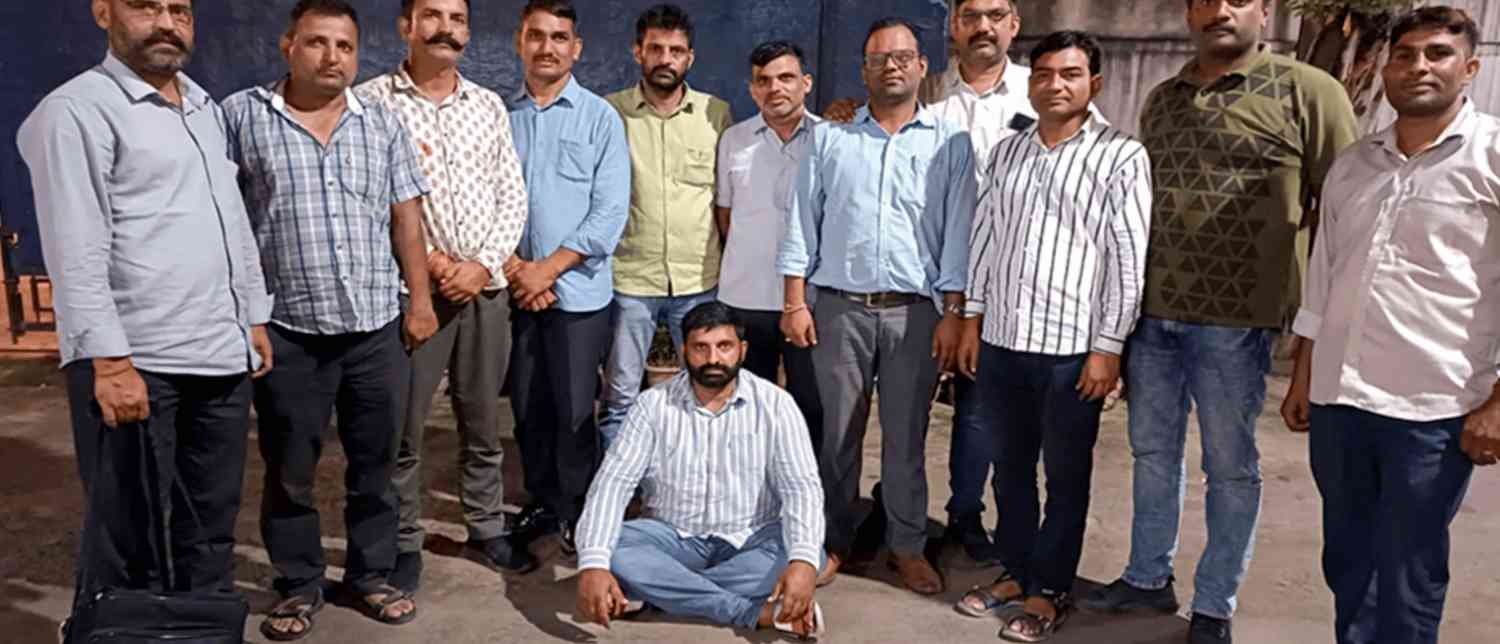In a shocking turn of events, a man once celebrated as a national hero for his role in defending Mumbai during the 26/11 terror attacks has now been exposed as the mastermind of a multi-state drug smuggling syndicate. Bajrang Singh, a former National Security Guard (NSG) commando, was arrested late Wednesday night by the Rajasthan Police after being found in possession of 200 kilograms of cannabis (commonly known as ‘ganja’). His arrest not only exposes the dark transformation of a soldier into a criminal but also highlights the growing nexus between narcotics and organized crime in India.

The Arrest That Shook Rajasthan
Inspector General of Police (IGP) Vikas Kumar announced on Thursday that Singh was apprehended from Ratangarh in Rajasthan’s Churu district following an extensive operation codenamed ‘Operation Gaanjaney’. The former commando, who hailed from Sikar district, carried a bounty of ₹25,000 and had been on the police radar for months.
Singh was reportedly the kingpin of a cannabis smuggling racket, operating primarily between Telangana, Odisha, and Rajasthan. Nearly 200 kilograms of ganja were confiscated from him at the time of his arrest. According to IGP Kumar, “This operation was a result of weeks of planning and intelligence sharing. The arrest of a hardened operative like Bajrang is a significant achievement in neutralising the terror-narcotics nexus in Rajasthan.”
The Peculiar Clue That Brought Him Down
Singh’s capture was not easy. For nearly two months, the Anti-Terrorist Squad (ATS) and Anti-Narcotics Task Force (ANTF) had been tracking him across states. Singh, aware of law enforcement’s pursuit, frequently changed hideouts and used fake mobile IDs to remain undetected. But it was a peculiar personal habit that eventually betrayed him: he always traveled with a trusted Odiya cook.
Investigators tapped into the communications of the cook’s relatives, which ultimately revealed Singh’s hideout in Ratangarh. After gathering sufficient ground-level intelligence, the ATS and ANTF teams monitored his movements closely. When they finally spotted him on a motorcycle, they chose not to act immediately, recognizing the potential danger in confronting a trained commando. Instead, they followed him to his hideout and executed a carefully planned raid that ended in his arrest.

From the Nation’s Defender to a Drug Smuggler
Bajrang Singh’s story is a tale of drastic transformation. Born in Rajasthan’s Sikar district, Singh left his studies after Class 10. His tall, imposing figure and physical fitness made him a perfect candidate for the Border Security Force (BSF), which he joined soon after. During his BSF service, he was posted across Punjab, Assam, Rajasthan, Odisha, and West Bengal, where he fought Maoists and protected India’s borders from infiltration.
His dedication and discipline eventually earned him a place in the NSG, India’s elite counter-terrorism force. Singh served as a commando for seven years and was part of the crack team deployed during the 2008 Mumbai terror attacks. His bravery during the 26/11 operations placed him among those who risked their lives to protect the nation from one of its darkest chapters.
But after retiring in 2021, Singh’s life took a different turn. He entered politics in his village, even fielding his wife as a candidate in local elections. The attempt, however, failed. Disillusioned by politics and perhaps lured by the prospect of quick money, Singh shifted to organized crime. Leveraging his experience and connections from his BSF days in Odisha and Telangana, he began building a network in the narcotics trade.
The Rise of a Kingpin
Unlike small-time dealers, Singh directly engaged in transporting massive consignments of ganja across state borders, taking risks that promised huge profits. Within a short span of time, he rose in the ranks and emerged as a central figure in the drug smuggling ecosystem.
His name cropped up in multiple cases over the years. In 2023, Singh was arrested near Hyderabad with two quintals of ganja. Several other cases were registered against him in Rajasthan, including one in his home district, Sikar, where multiple quintals of cannabis were seized. Despite these encounters with the law, Singh managed to remain active in the drug trade until his recent arrest.
A Political and Criminal Nexus
According to Rajasthan Police, Singh’s brief stint in politics was crucial to his transformation. It connected him with influential local networks and criminal elements. He reportedly realized the financial potential of the ganja business during this period. With old contacts in Odisha from his BSF days and new allies in Rajasthan, Singh had both the knowledge and the means to establish himself as a kingpin.
The police revealed that Singh often used his village standing and reputation as a former commando to expand his influence. His criminal operations were not just about smuggling drugs but were increasingly intertwined with terror-linked activities, raising concerns about a broader narcotics-terror nexus.
The Ganja Business: High-Risk, High-Reward
Singh’s modus operandi was to traffic huge consignments across state lines, dealing in quintals rather than smaller amounts. This made him both a lucrative player in the narcotics world and a prime target for law enforcement. His network stretched from the forests of Odisha and Telangana, where cannabis cultivation is rampant, to consumer hubs in Rajasthan.
For Singh, the risk seemed worth it—until now. His eventual capture marks a significant blow to the illegal ganja trade in Rajasthan, which has been battling a surge in smuggling activities from eastern states.
The Operation That Brought Him Down
The ATS and ANTF teams worked relentlessly for two months, piecing together fragments of intelligence and tracing Singh’s movements across states. Despite his attempts to remain in hiding—using fake mobile identities and moving between remote villages—the agencies found a breakthrough in his cook’s communication trail.
The final operation in Ratangarh was conducted with precision. The teams monitored Singh for hours before moving in, ensuring that the high-risk arrest of a trained commando was carried out without casualties. The success of Operation Gaanjaney is being hailed as a major achievement by Rajasthan Police.
What Singh’s Arrest Means
Singh’s capture has wide implications. According to police, his arrest is expected to significantly weaken the drug trafficking channels that connect Odisha and Telangana to Rajasthan. Given his central role, the operation has disrupted a major supply chain, though law enforcement agencies are aware that other players remain active.
Inspector General Vikas Kumar emphasized, “The arrest of Bajrang Singh is not just about seizing narcotics. It is about dismantling a network that threatened to link narcotics smuggling with larger criminal and terror activities.”
A Fallen Hero
Bajrang Singh’s story is one of stark contrast. From defending India against terrorists during one of its darkest hours, he ultimately betrayed the very ideals he once stood for. His descent into the world of narcotics highlights how ambition, greed, and disillusionment can corrupt even those once considered national heroes.
As Rajasthan Police celebrates the success of Operation Gaanjaney, Singh’s fall from grace serves as both a cautionary tale and a reminder of the complex fight against narcotics trafficking in India.
With inputs from agencies
Image Source: Multiple agencies
© Copyright 2025. All Rights Reserved. Powered by Vygr Media.























